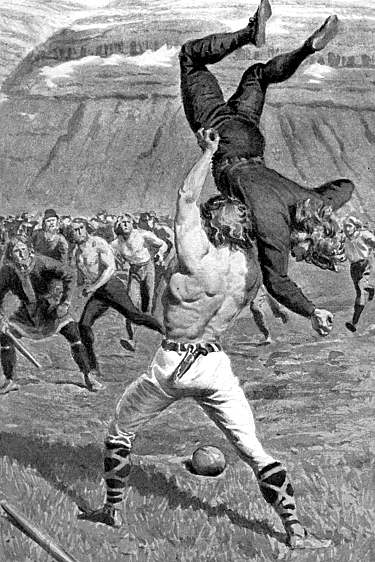
|

|
Gísli Súrsson
born: 939 at Stokkar in Súrnadalur in Norway
died: 979 in Geirþjófsfjörður, Iceland
married: Auður Vésteinsdóttir
Gísli was an ordinary man placed in the extraordinary situation of having to decide between two bad choices. As part of an escalating dispute, Vésteinn, the brother of Gísli's wife Auður, was killed in bed at night while visiting Gísli's home. Although the saga author doesn't specifically say so, Gísli suspected Þorgrímur, the husband of his sister, Þórdís.
Honor demanded that Gísli kill Þorgrímur to avenge Vésteinn's death, but to kill a family member was unthinkable. Like many admired people in the Viking age, Gísli did not get bound up by this difficult choice. He made his decision and put his plan into action. He killed Þorgrímur.
While there was no evidence to prove Gísli was the killer, he was prosecuted. Through bad luck caused by a curse, Gísli was outlawed. The word outlaw had a very different meaning in Viking society than it does today. For most people, it was a virtual death sentence, since anyone was free to kill an outlaw without penaly, and many tried for the honor it brought them. Þorgrímur's family and friends repeatedly tried to track Gísli and kill him as he lived as an outlaw. After his death, the saga author commented that Gísli never once retreated, and that his last blow was no weaker than his first. In this passage from the saga, Gísli was playing knattleikur, the Viking ball game, against Þorgrímur, whom he suspected of killing Vésteinn.
 |
The games now started up as if nothing had happened. They played
knattleikur at Seftjorn pond and there was always a large crowd. They
started the game and Thorgrim was outmatched. Gisli brought him down and
the ball went out of play. Then Gisli went for the ball, but Thorgrim
held him back and stopped him from getting it. Then Gisli tackled
Thorgrim so hard that he could do nothing to stop falling. His knuckles
were grazed, blood rushed from his nose and the flesh was scraped from
his knees.
Gísla saga, ch. 15 |
After the incident, Þorgrímur turned towards Vésteinn's grave mound, visible from the ball field, and recited a half-verse of poetry which could be interpreted to mean that he was not sorry for Vésteinn's death. Gísli gave back as good as he got by reciting a matching half-verse mocking Þorgrímur and revealing that he was not sorry for knocking him down and bloodying him.
|
|
©2013-2026 William R. Short |